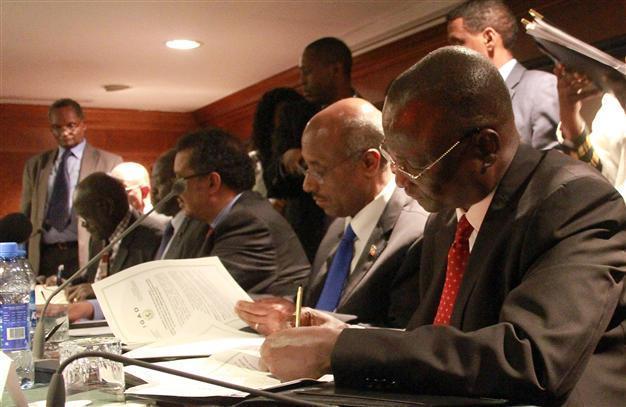South Sudan rebels claim attacks as ceasefire deadline looms
JUBA - Agence France-Presse

South Sudanese politician Taban Deng Gai, Intergovernmental Authority on Development (IGAD) envoy Seyoum Mesfin, Ethiopian Foreign Minister Tedros Adhanom, member of the ruling Sudan People's Liberation Movement (SPLM) Nhial Deng Nhial, and Chief mediator and former Kenyan general Lazaro Sumbeiywo, sign a ceasefire agreement on January 23, 2014 in Addis Ababa. AFP Photo
South Sudanese rebels accused the army of attacking their positions Friday hours before a ceasefire deal agreed by the government and rebels comes into effect.
Rebel spokesman Lul Ruai Koang said "simultaneous attacks have been launched" by the army on rebel positions in the northern oil state of Unity, and in the volatile eastern Jonglei region.
But army spokesman Philip Aguer said he had "no reports of fighting", and that clashes in Jonglei had taken place before the deal was signed, when rebels attacked government forces.
Government and rebels pledged on Thursday to halt fighting within 24 hours and end five weeks of bitter conflict that has left thousands dead, but both sides have said they doubt the other can fully control the forces on the ground.
The ceasefire was due to go into effect at around 1730 GMT.
Koang alleged that South Sudanese government troops -- as well as Ugandan soldiers and rebels from neighbouring Sudan's war-torn Darfur region, the Justice and Equality Movement (JEM) -- had attacked rebel positions, warning that rebel fighters had the "right to defend themselves against this senseless aggression." The ceasefire agreement was signed late Thursday in the Ethiopian capital Addis Ababa by representatives of South Sudan's President Salva Kiir and rebel delegates loyal to ousted vice president Riek Machar, and was greeted by cheers from regional peace brokers and diplomats.
US President Barack Obama, whose country provided crucial backing on South Sudan's path to statehood, described the deal as "a critical first step toward building a lasting peace".
UN chief Ban Ki-moon praised mediation efforts and called on both sides to "immediately implement" the agreement. Mediators from the East African regional bloc IGAD, which has been brokering the peace talks, said the deal will put in place a verification and monitoring mechanism for the truce and allow unrestricted access to aid workers.
Up to 10,000 people are believed to have been killed in the fighting pitting forces loyal to Kiir against a loose coalition of army defectors and ethnic militia nominally headed by Machar, a seasoned guerrilla fighter.
Presidential spokesman Ateny Wek Ateny insisted the situation was calm Friday, and said that orders had already been issued to soldiers "not to fight anybody from now on".
"As far as I know there is no fighting since yesterday... no single gunshot anywhere," Ateny told reporters in Juba.
"We hope the rebels will honour their signature." The fighting has been marked by atrocities on both sides with more than half a million people forced from their homes in the impoverished nation.
There has also been a wave of brutal revenge attacks, as fighters and ethnic militia use the violence to loot and settle old scores.
More than 67,000 people are crowded inside UN peacekeeper bases across the country with most hesitant to leave the protection offered by the compound.
"No one I know is preparing to leave yet, they want to wait to see how things turn out," said David Choul, one of thousands squeezed into a former sports ground turned into a UN base in Juba.
Government delegation head Nhial Deng Nhial said he was sceptical of the rebels' capacity to rein in their forces, "given that the bulk of the rebels are made up of civilians" -- essentially any one of the countless people who have kept hold of their guns after decades of conflict.
But Rebecca Garang, widow of South Sudan's independence leader John Garang, and who stood with Machar to make a political challenge to the government in December before fighting began, dismissed such concerns.
"The ceasefire did not just come alone in isolation without Dr Riek (Machar) knowing what is going on... so I think he will be able to talk to all of them and control them," she told the BBC.
Daniel Deng Bul, who as the Episcopal Archbishop of South Sudan is one of the most senior spiritual leaders in the young nation, welcomed the deal but warned it would need support to be implemented.
"It creates a space for us to talk, a breathing space," Bul said. "Those who are brokering the agreement have to see it is properly secured."
